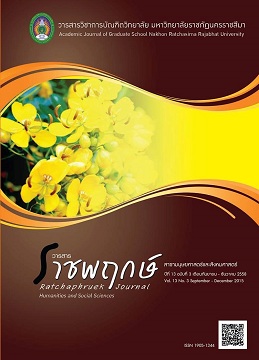สมองกับอารมณ์: มหัศจรรย์ความเชื่อมโยง
Main Article Content
Abstract
อารมณ์เป็นศูนย์กลางของชีวิตมนุษย์ เกี่ยวข้องกับความคิด ความรู้สึก และการตัดสินใจ ซึ่งทำให้มนุษย์มีชีวิตชีวา และความรู้สึกแตกต่างจากสิ่งมีชีวิตอื่นๆ บนโลกใบนี้ อารมณ์ส่งผลต่อร่างกาย การรู้คิดและพฤติกรรม ในแง่ของการศึกษา พบว่าอารมณ์ส่งผลต่อกระบวนการเรียนรู้ที่มีประสิทธิภาพ หากบุคคลอยู่ในสภาวะอารมณ์ที่พร้อมต่อการเรียนรู้ เขาจะ เรียนได้ดี มุ่งมั่นและพร้อมฝ่าฟันอุปสรรค เพื่อไปยังเป้าหมายที่ต้องการได้ ดังนั้นนักจิตวิทยาและนักประสาทวิทยาศาสตร์ต่างมุ่งเน้นศึกษาการเกิดอารมณ์และผลของอารมณ์ เพื่อนำผลการศึกษาไปบูรณาการกับศาสตร์ต่างๆ ผลการศึกษาพบว่าสมองและอารมณ์มีความสัมพันธ์กันอย่างมหัศจรรย์โดยอะมิกดาลาในระบบลิมบิก ตอบสนองต่ออารมณ์กลัว และกระตุ้นการตอบสนองและพฤติกรรมทางอารมณ์ที่เกิดขึ้นอย่างอัตโนมัติ โดยผ่านไฮโปทาลามัส แต่การควบคุมอะมิกดาลาอยู่ที่พรีฟรอนทอล คอร์เท็กซ์ซึ่งทำหน้าที่บริหารจัดการให้บุคคลมีการแสดงออกทางอารมณ์ที่เหมาะสม นอกจากนี้สารสื่อประสาทส่งผลต่ออารมณ์ และพฤติกรรมการประเมินอารมณ์ทำได้โดยการรายงานตนเอง การสังเกตพฤติกรรม และการเปลี่ยนแปลงของร่างกายรวมทั้งตรวจวัดการทำงานของสมอง ซึ่งการประเมินที่มีประสิทธิภาพช่วยให้บุคคลสามารถตระหนักรู้ต่ออารมณ์ได้อย่างรวดเร็ว และจัดการกับอารมณ์ของตนเองได้อย่างถูกต้องและเหมาะสม
Brain & Emotions: A Miracle Connection
Emotion is a center of human life and connects to thinking, feeling, anddecision making, which helpshuman to live lively and feels different from all living creatures. Emotion also effects to body, cognition, and behaviors. In additions, emotion has an effect on the academic achievement. If a learner has an emotional readiness to study, he/ she will study well, gain commitment, and be ready to overcome obstaclesin order to reach the desired goals. Thus, the psychologists and neuroscientists focus to study how emotionsare happened and its effects in order to integrate the results of studies into the various sciences. The results of studies have shown that there is a miracle connection between brain and emotions. Amygdala in the limbic system is a key structure in the mediation of fears and evokes autonomic responses and emotionalbehaviors through the hypothalamus. However, Amygdala can be controlled by executive functions of the prefrontal cortexto behave appropriately. In additions, neurotransmitters may effect to emotions, as well as inhibition or certain behaviors. The emotional evaluations can be measured by utilizing self-report, observe behaviors and physiological changes including brainwave pattern and activity. The effective assessment helps individuals in recognizing and coping with their emotions correctly and accurately.


